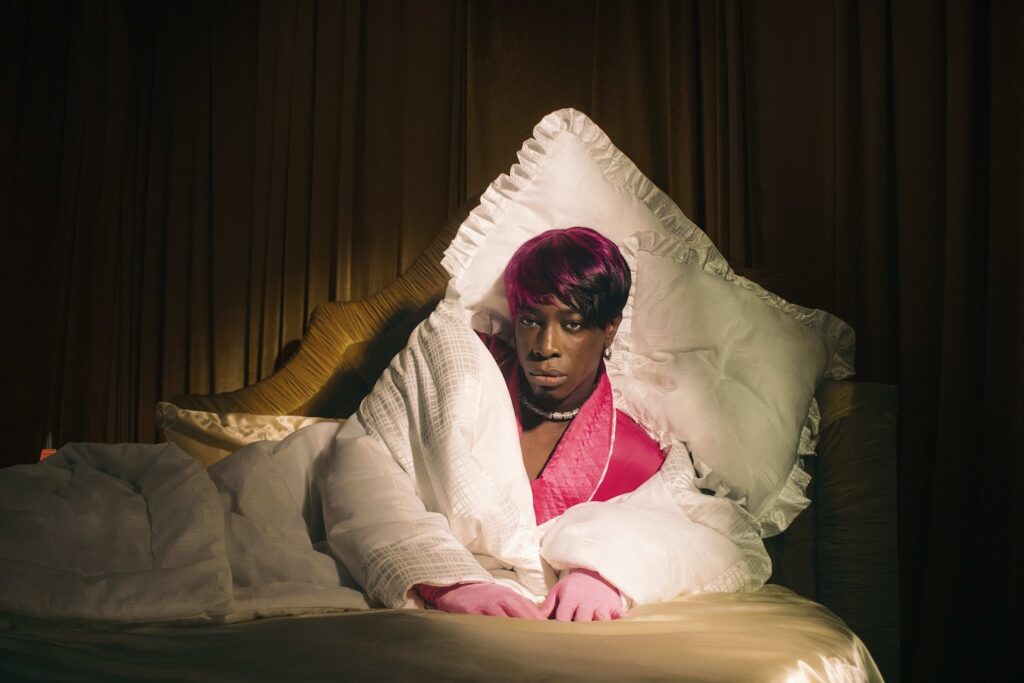Brooklyn-based musician Khalifa released the carpe diem ditty “Right Now” in late May, just in time for summer. The song’s bouncy synthesizers give way to a propulsive dance-pop-rock hybrid as he sings, “What if I broke the chains and ran away? / I become my own creation / I’m tired of waiting.”
It’s been more than eight years since Khalifa (real name Khalif Diouf)’s last proper project, an album released in 2015. At the time, he was known as the rapper Le1f. It’s a long hiatus in a pop music career, especially as social media algorithms reduce Andy Warhol’s 15 minutes of fame to smaller increments. Diouf is one step ahead of musicians new to the industry, but he knows not to underestimate the fans eager to see the return of the artist formerly known as Le1f.
“I know not a lot of people are expecting an up-tempo song with synth guitars,” he admits with a laugh over Zoom.
Presumably, what those listeners were hoping for was something like “Wut,” his signature track under the name Le1f, the one that propelled the musician to the pinnacle of underground music over the previous decade. Sparsely horn-sampled and sub-bass-heavy, it introduced the world to a rapper and producer equally adept at disdainful sneers and double-quick, polysyllabic attacks.
Perhaps most notably, among the still-resonant couplets (“Throw jewels, raise the bar, young phenomenon/I wanna launch a neo-Nazi kamikaze and hurl Molotov cocktails”) was a brazen seduction line that’s still all too rare in mainstream rap: “He’s got the heat in his eyes, he wanna suck my muscles/Want to burst my bubble and see what’s going on in my jungle.”
“Wut” quickly became part of queer music’s legacy. But it also led to press categorizing Le1f as a “queer rapper”—not just as a rapper, but alongside peers like Cakes da Killa, Mykki Blanco, and Zebra Katz. In retrospect, he can see both the negative and the positive. Defining Le1f and his peers in terms of their social identities rather than their musical identities may have excluded them from the mainstream conversation, but it also contributed to a nascent culture.
“I have like 100 daughters, and Cakes has 100 daughters,” he says of his musical offspring. “It’s a legacy of freedom and a path for a lot of young queer artists.”
Diouf released music consistently and while making waves for a few years, releasing his debut album Riot Boi on XL Recordings and Terrible Records, before going on hiatus and calling his experience as Le1f a disappointment, though he says it was “fun.”
“Working with a major label was a bit daunting for me at the time,” he says, “and my enthusiasm waned before I understood all the back-end business and had the team in place.”
As the buzz faded, Diouf hoped to take a step back to regroup and return more prepared, ideally rebranding under a name closer to his real name. But in a now-familiar twist, the onset of the pandemic put those plans on hold. All was not lost; he was able to use the time spent socially distancing to study music theory and composition. Studying a range of musical topics helped Diouf understand his intentions as a musician and how the music he was making related to everything from prehistoric sub-Saharan instruments to Little Richard.
“The abundance of materials and inspiration gave me the drive to be ambitious and make what I wanted, how I wanted,” he says.
During the period between Le1f and Kalifa, Diouf found it difficult to have the mental and physical space he needed to execute his vision, so he worked with both opera and R&B vocal trainers to hone his skills and is now comfortable experimenting and performing as a vocalist (even if he feels “a little embarrassed” to call himself a singer).
Over the past few years, he’s been able to trace his music back to its source of inspiration, amassing a cohesive record of songs that pay homage to mainstream black-rooted genres like rock and disco. He knows what he wants to do with his next “three and a half albums,” and after a long hiatus, he knows he needs to get started as soon as possible.
“The stuff I’ve been making is so much better than anything I’ve put out to date… it’s so much more accessible and sophisticated than anything I’ve released to date,” he says. “When you listen to them side by side, it’s like night and day.”


